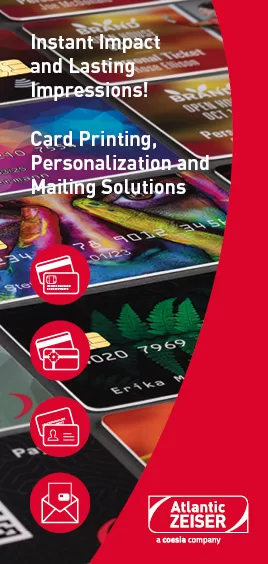
by Jennifer Kohlhepp | CM Industry News
Industry News
Hong Kongers Must Replace Older Smart ID Cards with New Ones
Hong Kong: Hong Kong residents are being urged to replace their old smart ID cards under a new government mandate issued through the 2024 Invalidation Order. Cards issued between June 23, 2003 and November 25, 2018—or applied for before November 26, 2018—will be invalidated based on the cardholder’s birth year: May 12 for those born in 1970 or later and October 12 for those born in 1969 or earlier.
Using the Card “Beyond” Payments to Find the Holy Grail
As payment fraud rises—particularly in online, Card Not Present (CNP) transactions—card issuers are exploring innovative solutions to reduce fraud without adding friction. Traditionally, security came at the cost of convenience, but new technologies are helping bridge that divide. EMV chip technology and initiatives like 3D Secure have improved in-store and online security, though adoption remains uneven. Now, emerging card innovations—such as numberless cards accessed via apps, tap-to-activate features and smartphone-authenticated transactions—are transforming the physical card into a dynamic, secure and user-friendly tool. These advances not only enhance fraud prevention but also elevate the card’s role in the digital economy, bringing the industry closer to the “holy grail” of seamless, secure payments.
Old Greek ID Cards Will No Longer Be Valid After August 2026
In 2023, Greece announced plans to issue new ID cards with enhanced security features to comply with EU regulations, requiring replacement of all existing cards by August 2026. The move has stirred public debate and misinformation, including the false claim that old cards never expire. In reality, under EU Regulation 2019/1157, non-compliant ID cards, like the old Greek ones, will no longer be valid after August 3, 2026. Although the old cards don’t display an expiration date, they are legally valid for only 15 years.
Contactless and Sustainable Cards Surge as Global Shipments Hit 2.5B in 2024
In 2024, Smart Payment Association members shipped 2.5 billion payment cards and chip modules, returning to 2022 levels after a temporary spike in 2023 caused by post-pandemic inventory corrections. Contactless cards dominated the market, accounting for 92% of global shipments, with widespread NFC adoption across all regions—India now leads at 98% adoption. Sustainable cards also surged, growing 28% year-over-year to make up one-third of global shipments, led by Europe at 76%. SPA President Andreas Strobel highlighted the industry’s resilience and continued progress toward more secure and environmentally friendly payment solutions.
Iris-Scanning Biometric Verification Goes Live with Exclusive Visa Card
World, a company co-founded by OpenAI CEO Sam Altman, is launching a biometric identity system using a device called the Orb, which scans users’ irises to generate a secure World ID. Participants receive crypto rewards and can use their World ID to access supported platforms—and notably, gain access to an exclusive World Visa card. This card is part of a broader effort to create a fraud-resistant, blockchain-based identity and payments ecosystem that integrates biometrics, digital identity, and financial perks.
Guyana Preparing to Issue New Biometric ID Cards in 2026
Guyana’s Vice President Bharrat Jagdeo announced that the country will begin issuing next-generation biometric ID cards in the second quarter of 2026 as part of a broader digital transformation agenda. Designed to distinguish citizens from foreigners, the new IDs will provide preferential access to public and private services, support financial inclusion by enabling secure banking and transactions and aid in real-time border control. Backed by a $4.8 million allocation in the 2025 national budget and involving technology firm Veridos, the project aligns with Guyana’s ICT Masterplan 2030 to modernize sectors like healthcare, education and public administration, while advancing national security, development and global competitiveness.
Ramp Reportedly Angles for Part of $700B US Credit Card Program
Financial tech startup Ramp is pursuing a potentially lucrative $25 million pilot project to modernize the federal government’s $700 billion SmartPay charge card program, which serves 550 agencies and handled nearly $40 billion in spending last fiscal year. According to ProPublica, Ramp has held at least four meetings with Trump-era GSA appointees to discuss the opportunity, though the agency denies any preferential treatment. The SmartPay program, operated by Citibank and U.S. Bank, has been a major source of revenue for those banks, and the GSA is now evaluating options for its next generation. Ramp, founded in 2019, claims its technology can help reduce waste and optimize spending, and states it’s competing through a standard procurement process as the GSA continues its review.
Merchants Continue to Improve Gift Card Programs, a Blackhawk Study Finds
U.S. merchants significantly improved their gift card program performance in 2025, as revealed by Blackhawk Network’s eighth annual review. Staples Inc. led all merchants with a score of 104%, followed closely by Amazon.com at 101%, while Best Buy Co. Inc., Sephora USA Inc. and Target Corp. rounded out the top five. The improved scores, including scores surpassing 100%, were attributed to merchants investing in mobile delivery, AI-driven personalization, and greater payment flexibility, reflecting a stronger commitment to consumer preferences. Evaluating 100 merchants across 17 vertical markets using 126 criteria, the study found nearly all market verticals achieved notable year-over-year increases, with consumer electronics/office stores leading at 92%, health/beauty merchants at 82% and mass merchants at 77%.
Social Buzzes with ChatGPT-Generated Passports and ID Cards
Polish engineer and investor Borys Musielak sparked alarm in the security industry by using ChatGPT to generate a fake passport capable of passing automated Know-Your-Customer (KYC) checks, highlighting the vulnerability of image-based verification systems to generative AI. Musielak warned that both static and video selfies can be faked, enabling forged documents to be created rapidly and at scale. He advocates for chip-based and digitally verified identity solutions, such as NFC-enabled eID wallets, as a more secure alternative. Following the stunt, others replicated the technique to create fake ID documents like India’s Aadhaar and PAN cards, prompting ChatGPT to quickly implement safeguards, including rejecting such prompts and adding disclaimers like “sample” and “not for official use” on generated content.
Wyoming: First State to Reach Real ID Readiness
The Wyoming Department of Transportation (WYDOT) issued a reminder that all driver’s licenses and ID cards from its Driver Services are Real ID compliant. While the federal deadline for Real ID compliance is May 7, 2025, Wyoming has met these standards since 2011, making it one of the first states to achieve Real ID readiness.
Somalia Mandates Use of Biometric ID
Somalia’s Prime Minister Hamza Abdi Barre has mandated that all government and private sector service providers integrate the national biometric ID card for citizen verification, as part of the country’s broader National Transformation Plan to modernize public services. The directive follows a high-level meeting on April 7 to review and refine the national ID rollout strategy ahead of a mass enrollment campaign. Supported by Pakistan’s NADRA, the initiative aims to provide all citizens with secure legal identification, enhance governance, and boost development in the post-conflict nation. Officials emphasized the ID’s role in improving trust, security and access to services, while praising NIRA staff as key to successfully implementing Somalia’s first national ID system in over 30 years.
Barclays Reports Growth in UK Contactless Spending
In 2024, contactless payments in the UK reached a record 94.6% of eligible in-store card transactions, up from 93.4% in 2023, with users averaging 236 uses and spending £3,803 annually—both increases from the previous year. The over-65 age group remained the fastest-growing group of users, with 84.1% adoption, driven by convenience, as 67% of those aged 61–79 found contactless easier than chip and PIN. While chip and PIN remained the most popular method for purchases over £100 (78%), preferences varied by age: Gen Z and millennials favored mobile wallets over cash, with 42% and 33%, respectively, choosing them as a top payment method for higher-value transactions.
Half of All Contactless Payments in Ireland Now Made Via NFC
In 2024, contactless payments accounted for 87.1% of all card transactions in Ireland, with over half made via NFC-enabled mobile phones, according to the Banking & Payments Federation Ireland (BPFI). A total of 1.5 billion contactless point-of-sale payments, worth €26.7 billion, were made across retail outlets. On average, each person made 296 contactless payments using Irish cards, with 159 of those made through mobile wallets.
Personalized Gift Cards: The Cornerstone of Employee Engagement Programs
Organizations across industries are continually seeking ways to enhance corporate culture and employee engagement, but large, dispersed companies often struggle to deliver the personal touch needed to keep employees motivated. In a PaymentsJournal podcast, Julie Gu of Prezzee and Jordan Hirschfield of Javelin Strategy & Research discussed emerging trends in employee incentive programs, highlighting the challenges companies face and how customized gift card solutions can be a powerful tool for boosting engagement and fostering a more connected workforce.





